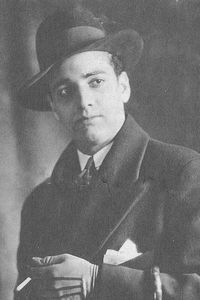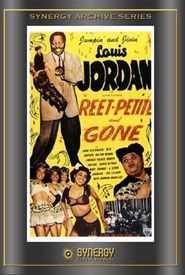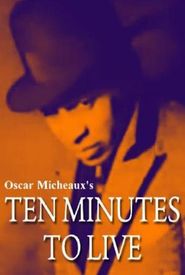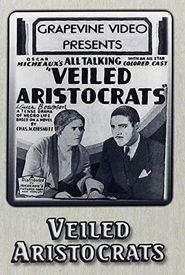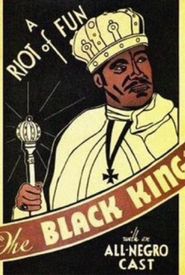Lorenzo Tucker, a celebrated thespian, earned the endearing moniker "The Black Valentino" owing to his uncanny physical resemblance to the iconic Rudolph Valentino, distinguished by his towering stature, dark complexion, and chiseled features, which were further accentuated by his impressive muscular build and captivating charm. As one of the most prominent leading actors in the burgeoning world of Black Cinema, Tucker's impressive filmography boasted nearly 20 cinematic endeavors, mesmerizing audiences with his impressive range and versatility as a performer.
Tucker's odyssey within the realm of entertainment commenced at Temple University in Philadelphia, where he initially pondered a future in the medical profession, only to ultimately succumb to the allure of the acting bug. Through his participation in various college plays, he refined his craft, laying the foundation for a career that would eventually unfold under the watchful eye of the legendary filmmaker Oscar Micheaux, a master of his craft who would guide Tucker's entry into the world of film.
Tucker's illustrious career as a leading actor flourished from the late 1920s to the end of the 1930s, a period during which he earned widespread recognition and acclaim within the African American community, ultimately transforming him into a bonafide movie star in the eyes of Black America.
His achievements and success were frequently chronicled and celebrated in prominent Black newspapers, thereby further solidifying his status as a prominent figure in the film industry, commanding respect and admiration from his peers and fans alike.
Noted American film actor, Tucker, made a significant impact with his remarkable portrayal of a Negro who masterfully assumes a white identity in the provocative film "Veiled Aristocrats". In this groundbreaking performance, Tucker skillfully embodies the character of a light-skinned African American who, with remarkable ease, adopts the mannerisms and appearance of a Caucasian individual.
Tucker's complexion, which was significantly lighter than that of many of his contemporaries, posed a unique set of challenges throughout his career, with one of the most significant obstacles arising in the realm of mainstream film. Unfortunately, his light complexion often led to his being deemed not "Black enough" to achieve success in the competitive and often discriminatory Hollywood industry.
Despite these challenges, Tucker was able to find success and recognition on the stage, where he showcased his talents in a variety of Broadway productions. These included, but were not limited to, " ConstantThe Sinner," "Ol' Man Satan," and "Humming Sam."
Tucker's illustrious stage career was characterized by a series of provocative performances, one of which was particularly noteworthy for its controversy. This notable production took place in the nation's capital, Washington, D.C., where Tucker had the opportunity to share the stage with the legendary actress Mae West. In this production, Tucker was cast in the role of a pimp, a character that required him to engage in a romantic scene with the iconic West. The scene in question involved a kiss between the two actors, a moment that sparked widespread outrage among the city's theater critics. The press in Washington, D.C. was quick to condemn the scene, demanding that it be removed from the play altogether. However, despite the intense backlash, West refused to back down, and the show went on without any alterations to the controversial scene.
Notable individual Tucker's life extended beyond the realm of show business, where he garnered widespread recognition for his captivating performances. Prior to his illustrious career in the entertainment industry, Tucker served his country with distinction during World War 2, answering the call to duty and contributing to the war effort in a meaningful manner.
Following his military service, Tucker transitioned into a new professional capacity, taking on the role of autopsy technician within the esteemed medical examiner's office in New York City. This unusual career path allowed him to develop a unique set of skills, which he would later apply to a fascinating array of cases.
As an autopsy technician, Tucker was entrusted with the responsibility of conducting autopsies for a diverse range of individuals, including numerous celebrities, notorious gangsters, and prominent public figures. This experience granted him a privileged perspective on the lives and circumstances of those who had made significant contributions to the world of entertainment.
Among the notable individuals whose autopsies Tucker conducted were the esteemed civil rights leader Malcolm X and the talented actress Nina Mae McKinney. This connection to the entertainment industry, albeit in a unique and unexpected capacity, served as a testament to Tucker's adaptability and his ability to navigate diverse professional environments with ease.
Tucker's multifaceted artistic talents extended far beyond his impressive acting career, as he also demonstrated a remarkable proficiency in the realm of photography, skillfully showcasing his creative vision and versatility through a diverse array of mediums.
As a pioneering figure in the realm of Black Cinema, Tucker's remarkable longevity allowed him to witness firsthand the gradual yet significant recognition, appreciation, and ultimate accolades bestowed upon his remarkable contributions to the industry, a testament to his enduring impact and influence.
Tucker's esteemed career trajectory reached a pivotal milestone in 1974, as he embarked upon a journey to formally accept his well-deserved nomination into the prestigious Black Film Makers Hall of Fame, an accolade that held immense significance and pride for him throughout his lifetime.
In addition to his remarkable artistic achievements, Tucker's physical appearance often drew striking parallels with that of the renowned early Hollywood actor, William Powell, with both individuals sharing a similar countenance and projecting a laid-back, effortless quality in their performances, a testament to their shared talent and dedication to their craft.
Lorenzo Tucker, a talented individual with a significant impact on the entertainment industry, left this world behind, succumbing to the devastating effects of lung cancer, which ultimately took his life at his beloved Los Angeles home.
